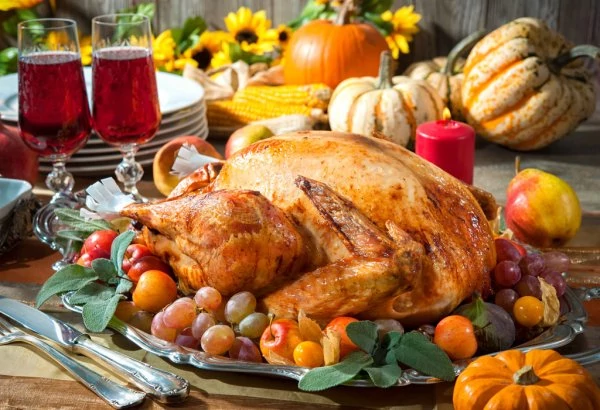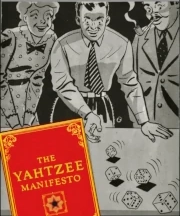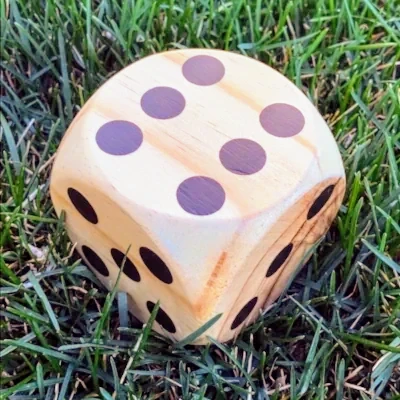The Christmas season has always been the busiest time of year for any Yahtzee comrade. The gathering of friends and loved ones, coupled with the frightful weather outside, combines to create a perfect atmosphere for indoor Yahtzee fun. A rousing game enjoyed in front of the fireplace with visions of sugarplums and Large Straights dancing in your head is hard to beat. And once you factor in the allure of mistletoe and eggnog, Christmas Yahtzee is an inevitability.

A Christmas Story Edition
2014
Even for people who disagree with its religious underpinnings, the Christmas season is one of the world’s most popular holidays. Exchanging gifts, returning to hometowns, and ugly sweaters are ingrained in the late-December tradition. This deep association of symbols and rituals has developed over centuries and continues to spread the popularity ever further, in both secular and pious manifestations.
Yahtzee is one of those rare games whose popularity continues to soar decades after its introduction. The ability to unite people in happiness is one of the fundamental qualities that enabled Yahtzee to endure for over 65 years. Many of its tabletop counterparts like Monopoly and Risk convey dark themes of bankruptcy and war. And the unfortunate natives of Catan, who were violently displaced by invading settlers, barely receive a second thought on game night. Yahtzee, on the other hand, continues to teach positivity, inclusivity, and real-world skills like math and tactical decision-making. It’s no wonder that the game remains a Christmas favorite. Like sleigh-bells, rampant consumerism, and indoor trees, Yahtzee is inherently linked to the holiday.
To uncover the true origins of the intimate connection between Yahtzee and Christmastime it is necessary to examine the genesis of the holiday itself. Indeed, the playing of dice games during the late December holiday season is one of the very foundations of western civilization.
Saturnalia

a game of proto-Yahtzee
Every good Christian knows that Christmas is the celebration of the birth of Jesus Christ. Many don’t know, however, that Mr. High-and-Mighty was probably not actually born on December 25th. Most likely, he was born sometime in the spring, like the Easter Bunny. Early Christian missionaries, seeking an easy way to convert the heathen European hordes, struck upon the brilliant concept of slapping their own religious doctrines right on top of existing religious holidays, replacing the so-called false gods with Jesus.
Creating a new holiday to commemorate the birth of the Christian savior called for some major culture appropriation. As luck would have it, a perfectly fine pagan Roman holiday was just sitting there ripe for the picking. Saturnalia was a celebration of Saturn, the god of seed-sowing and agriculture. The holiday was observed around the winter solstice in late December as a means to ensure a successful spring harvest.
The celebration of Saturnalia commenced with a religious ceremony at the temple of Saturn and a great feast that was free to all members of society, rich and poor alike. Its popularity with the lower classes was enhanced by a loosening of the strict social norms that typically regulated Roman life. In many ways these norms were outright inverted. Slaves and servants were permitted to enjoy gaming, throwing dice and gambling, while wearing colorful clothes and the hat of a freeman. Their masters would play the subordinate and serve food to their slaves, further adding to the hilarity. The slaves could thumb their noses, if only temporarily, at the corrupt hierarchical power structures that kept them in chains.

The societal role-reversal that played out during Saturnalia parallels the core Yahtzee principles of liberty, equality, and fraternity. Unfortunately, this aspect was not carried over to the Christmas tradition. But other rituals like the exchanging small gifts are hallmarks of both holidays. Not to mention the debauchery, tomfoolery, and drunken orgies. The Roman poet Statius described his experience at Emperor Domitian’s Saturnalia feast in glowing terms:
“Who can sing of the spectacle, the unrestrained mirth, the banqueting, the unbought feast, the lavish streams of wine? Ah! now I faint, and drunken with thy liquor drag myself at last to sleep.”
With visions of sugar plums dancing in his head, no doubt.
The popularity of Saturnalia continued to explode across the Roman world, thanks to its liberalized social policies, wild parties, and general merrymaking. It had even outgrown its origins as a single-day observation to become a full week of revelry. Shops and courts of law were closed during the holiday so that all people could partake in the festive hijinks. Public gambling was typically forbidden in Rome but no holds were barred during Saturnalia. The contemporary historian Lucian of Samosata made reference in 150 CE to dice games (and public drunkenness of course) in a description of the celebrations:
“…the serious is barred; no business allowed. Drinking and being drunk, noise and games and dice, appointing of kings and feasting of slaves, singing naked, clapping of tremulous hands, an occasional dunking of corked faces in icy water – such are the functions over which I preside.”
The seeds of drunk Yahtzee at Christmas had been planted.
Holiday Spirits: From Saturnalia Wine to Christmas Yahtzee

The Roman tradition of imbibing during Saturnalia has evolved into one of our most cherished Christmas customs. Just as ancient Romans loosened social constraints with wine and games, today's Christmas Yahtzee gatherings are enhanced by festive libations. Mulled wine, spiked eggnog, and holiday cocktails create the perfect atmosphere for Drunk Yahtzee to flourish as a beloved Christian Christmas game with pagan roots.
This pairing of drinks and dice has persisted for two millennia with remarkable consistency. What began as Saturnalian revelry with "lavish streams of wine" now manifests in ugly sweater parties where players balance scorecards and tumbling dice alongside their holiday spirits. The formula remains unchanged: gather loved ones, serve drinks, and roll the dice.
Yahtzee's accessible rules yet strategic depth make it perfectly suited for holiday drinking Yahtzee variations. Unlike complex games that become impossible after a few rounds of Christmas cheer, Yahtzee maintains its playability even as sobriety fades. Popular Drunk Yahtzee variations include taking a sip when rolling a Yahtzee, drinking when failing to score in the upper section, or the "Three of a Kind or Drink" rule that guarantees holiday merriment.
The social dynamics of Christmas Yahtzee with drinks mirror the same inversions of hierarchy that characterized Saturnalia. Office parties where executives and entry-level employees roll dice together temporarily dissolve workplace stratification – a modern echo of Roman slaves donning the freeman's hat during holiday celebrations.
In our hyper-connected yet physically distant world, Christmas Yahtzee provides rare moments of genuine connection. When smartphones are set aside in favor of scoresheet pencils and dice cups, authentic human interaction thrives. The warm glow of holiday spirits creates a space where multiple generations bond over probability and chance, just as their ancient Roman counterparts did.
As you gather around the table this Christmas season, scoresheet in one hand and mulled wine in the other, remember you're participating in one of humanity's oldest continuous traditions. The clinking of glasses and rattling of dice connect you to countless holiday revelers across the centuries. So raise a glass to Saturn, to Christmas, and to the timeless joy of Drunk Yahtzee!
Knucklebones

Sheep knucklebones
Lucian’s mention of “games and dice” as a principle element of the Saturnalia festivities, is a reference to an ancient game called Tali. It was an embyonic form of proto-Yahtzee that was imported to Rome from its North African and Middle Eastern colonies as soldiers returned from conquest. It initially gained popularity throughout the city’s lower classes but people from all walks of life rolled dice during Saturnalia.
Tali was played with an early form of dice called knucklebones, which were quite literally plucked from animal carcasses, usually sheep or goats. Known as Astragaloi or Astragals in Greek, knucklebones were the world’s original random number generators. But owing to the peculiarities of mammalian joint development, they are not true cubes - they can only land on one of four faces or sides - one flat, one concave, one convex, and one sinuous. Values were assigned to each face and this scoring system was often etched into the bone. Traditionally, the convex narrow side was called “chios” or "the dog", and was counted as One, the convex broad side as Three, the concave broad side as Four, and the concave narrow side as Six.
Knucklebones can be thrown like dice or played like jacks. Their gameplay features have even been imitated in modern games using asymmetrical dice, like Pass the Pigs. The Romans must have liked the sound of it because the game acquired a well-known nickname – Knucklebones.
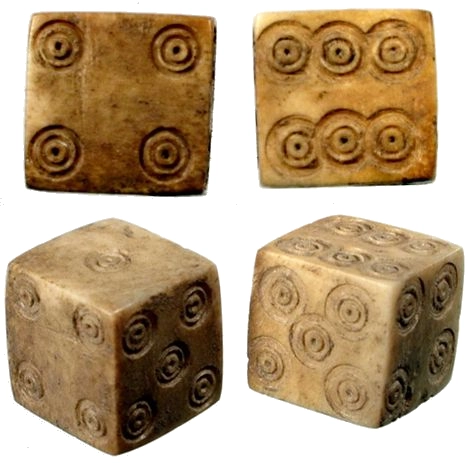
~100 AD
Knucklebones continued to be used as the primary game equipment but Tali could also be played using traditional six-sided dice. This vegan version employed Roman dice crafted of wood, bronze, glass, terracotta, or precious gems. Four bones or dice were used and 35 different scores were possible in a single throw.
The scoring system is similar to Yahtzee rules and would be familiar to any modern day dice enthusiast. It involves rolling the knucklebones or dice in different combinations to earn points. Much like Triple Yahtzee and Yahtzee Texas Hold ‘Em today, a wide variety of Tali derivative games proliferated. The rules for a basic version of the game are below, but more complex variations are possible, including playing under Senio Rules.
| 6, 4, 3, 1 | Venus | Each face is different |
| 6, X, X, X | Senio | One Six | 6, 6, 6, 6 | Vultures | Four-of-a-Kind |
| 4, 4, 4, 4 | Vultures | Four-of-a-Kind | 3, 3, 3, 3 | Vultures | Four-of-a-Kind |
| 1, 1, 1, 1 | Dogs | Lowest of the Vultures |
Tali is still enjoyed today, reinvigorated by the 21st century gamer. Some game manufactures even produce plastic knucklebones to capture the same gameplay as the originals. Goatee must be delighted.
Christian Christmas Yahtzee Games

While holiday merriment often embraces the Saturnalian roots of dice and drink, many families prefer to celebrate with Christian Christmas games that honor the religious significance of the season. The versatility of Yahtzee makes it perfectly adaptable for those seeking more reverent holiday entertainment that reinforces Christian values and Biblical teachings.
Christmas Yahtzee has been reimagined by numerous Christian families and church groups to incorporate elements of faith into gameplay. These adaptations transform a game with pagan origins into one that celebrates the birth of Christ, proving that even ancient dice games can find redemption through thoughtful modification.
Popular variations of Christian Christmas Yahtzee include "Nativity Yahtzee," where traditional Yahtzee categories are renamed to reflect the Christmas story. Players might roll for "Three Wise Men" instead of Three of a Kind, or "Star of Bethlehem" instead of Yahtzee. Some families replace the standard dice pips with Biblical symbols, turning each roll into an opportunity to recite parts of the nativity story when certain combinations appear.
Church youth groups often incorporate Christian Christmas Yahtzee into holiday celebrations, using the game as a teaching tool. When certain combinations are rolled, players must answer questions about the birth of Jesus or recite verses from Luke or Matthew. This indoctrinational educational approach transforms casual gaming into an engaging Bible study that reinforces the true meaning of Christmas.
Holy Rollers
Family-friendly Christian Christmas game nights frequently feature alcohol-free versions of Yahtzee that focus on fellowship and faith rather than the boisterous revelry of its Saturnalian predecessor. These gatherings emphasize the values of togetherness, charity, and mindfulness that align with Christ's teachings. Between turns, families might share their gratitude or blessings from the past year, creating meaningful holiday memories.
Commercial versions of Christian Christmas Yahtzee have emerged in recent years, with specially designed dice and scorecards featuring Biblical imagery and Christmas themes. These editions often donate portions of their proceeds to Christian charities, adding another layer of meaning to holiday gameplay.
The transformation of Yahtzee from its ancient pagan roots to a Christian Christmas game exemplifies how cultural traditions can be adapted and repurposed across millennia. This evolution demonstrates that regardless of origin, games that bring people together in joy and community can serve a higher purpose during the holiday season.
Yahtzee and Religion: Divine Rolls Across Faiths
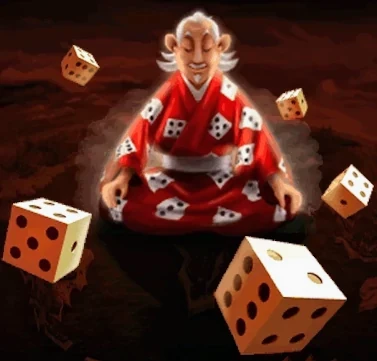
religious boundaries
Beyond its Christmas associations, Yahtzee enjoys a remarkable ability to adapt to various religious contexts and celebrations throughout the year. The game's fundamental elements – chance, strategy, and community – resonate across faith traditions, making it a surprisingly versatile vehicle for religious expression and teaching.
Judeo-Christian Traditions
The Judeo-Christian tradition has a complex relationship with games of chance. While gambling is often discouraged, non-wagering dice games like Yahtzee have found acceptance in many religious communities. During Hanukkah, some Jewish families incorporate Yahtzee alongside traditional dreidel games, with special scorecards featuring menorah imagery or Hebrew lettering. The eight nights of Hanukkah provide a perfect structure for a tournament-style Yahtzee competition.
Many Protestant and Catholic youth groups use Yahtzee as a teaching tool for Biblical numerology. The numbers 3, 7, and 12 hold special significance in scripture, and creative youth pastors have developed "Bible Yahtzee" variations where these sacred numbers earn bonus points. Some Sunday school programs use dice games to teach probability while simultaneously discussing divine providence – a tangible demonstration of how God's plan operates within apparent randomness.
Eastern Religious Applications
In Buddhist contexts, Yahtzee has been adapted as a mindfulness exercise. The focus required for strategic decision-making combined with acceptance of random outcomes aligns remarkably well with Buddhist principles. Some meditation centers have developed "Zen Yahtzee" practices where players contemplate impermanence between rolls and practice non-attachment to results – acknowledging that each roll, like each moment in life, is temporary.
Hindu communities have incorporated Yahtzee into Diwali celebrations, the Festival of Lights that often includes traditional games of chance. The five dice of Yahtzee are sometimes associated with the five elements of creation in Hindu philosophy: earth, water, fire, air, and space. Some families play a variation called "Lakshmi Yahtzee," invoking the goddess of prosperity while hoping for fortunate rolls.
Interfaith Applications
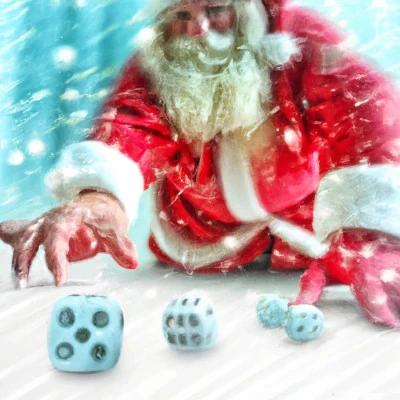
Religious leaders seeking common ground between traditions have found Yahtzee to be an unexpectedly useful tool for interfaith dialogue. The game's universal appeal and simple rules make it accessible across cultural boundaries, while its balance of luck and skill serves as a metaphor for how different faith traditions view divine intervention in human affairs.
Some interfaith centers host "Sacred Yahtzee" events where participants from diverse religious backgrounds share how concepts of chance, choice, and community manifest in their respective traditions. Between turns, players discuss theological questions, finding common ground through both conversation and friendly competition.
Philosophical Dimensions
The philosophical implications of Yahtzee extend into deeper religious questions. The game's blend of randomness and strategy mirrors theological debates about free will versus predestination that have occupied religious thinkers for centuries. Does a player's skill overcome bad luck, or is every outcome predetermined by forces beyond control? Such questions make Yahtzee not just entertainment but a springboard for spiritual contemplation.
Some religious scholars have even analyzed Yahtzee through theological lenses, noting how the game rewards both acceptance of circumstances beyond one's control and wise stewardship of opportunities – concepts central to many faith traditions. The player who rigidly pursues a strategy regardless of the dice rarely succeeds, just as the person who passively accepts whatever comes without strategic thought will likely fall short – a balance that many religions teach is essential for a well-lived spiritual life.
Whether played in a church basement, synagogue recreation room, temple gathering, or interfaith center, Yahtzee continues to demonstrate its remarkable adaptability to diverse religious contexts. As it crosses boundaries of faith and culture, this seemingly simple dice game reveals itself as a surprisingly profound tool for community building, teaching, and spiritual exploration.
Christmas Yahtzee Games

It has been speculated that there is a lost book of the Bible written by an unknown author, possibly Mary Magdalene, which portrays a young Jesus learning the trade of carpentry by fashioning wooden dice. With this side of Jesus in mind, it is not far-fetched to picture the prophet tossing around five knucklebone dice with his disciples. But until the pope declares the notion of a Yahtzee-loving, hippy Jesus as an infallible dogmatic definition, the World Yahtzee Institute cannot in good faith advance such a prospect. But Yahtzee is undoubtedly one of the best Christian Christmas games.
Whichever holiday you may or may not celebrate this December, chances are, no one will once greet you with a “Merry Saturnalia!” And you’ll be hard pressed to find any reference to its classic festive trappings like gladiator battles or gambling with sheep bones. This is, of course, evidence of the War on Saturnalia, which must be stopped. Nevertheless, it is a perfect time to reflect on Yahtzee’s long history and its gaming origins.
Jesus was successfully given a new birthday at the end of December and an old holiday morphed into the Christmas season that we know and love today. Adopting and adapting existing rituals so adeptly from other holidays would have made Dr. Frankenstein proud. So when you round up the gang this Christmas season for a night of Yahtzee and heathen ritual, just remember that Saturn is the original reason for the season.
But if you’re ever tempted with taking a Full House on the first roll of a game, you should always ask yourself, “What would Jesus do?” Happy Christmas Yahtzee!




